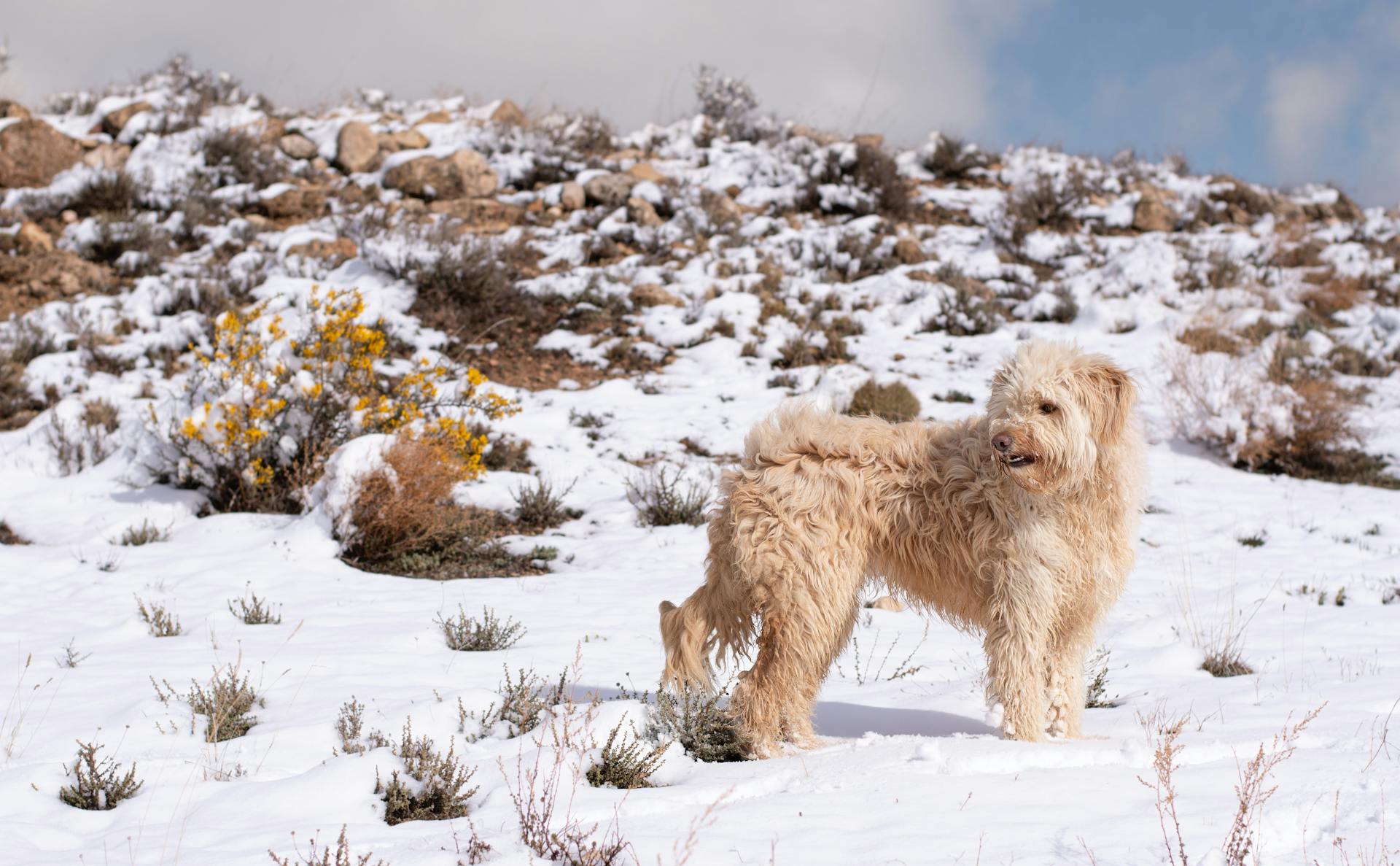
Labradoodles are a popular breed, and one of the most common questions people ask is how big they get. On average, a full-grown Labradoodle can weigh between 50-80 pounds.
Their height can vary depending on the size of their parent breeds, but generally, they can grow to be between 18-24 inches tall.
Labradoodle Size and Growth
Labradoodles come in three sizes: mini, medium, and standard. Their growth rate varies depending on their size, with mini Labradoodles reaching full size in 6-8 months, medium Labradoodles in 9-11 months, and standard Labradoodles in 12-18 months.
Mini Labradoodles typically weigh between 15 and 25 pounds and stand 14 to 16 inches tall, while medium Labradoodles weigh 30-50 pounds and grow 17-20 inches in height. Standard Labradoodles are the largest, weighing 50-70 pounds and standing 21-24 inches tall.
Here's a rough estimate of Labradoodle growth patterns:
Keep in mind that every Labradoodle is unique, and their size can vary depending on their parents and genetics.
How to Predict Your Dog's Size
Predicting your dog's size can be a fun and exciting part of the puppy-raising journey. Generally, the size of your dog will depend on the size of its parent breeds, with Labradors typically weighing between 55 and 80 pounds and Toy and Miniature Poodles generally weighing between 10 and 15 pounds.
To get an idea of your dog's adult size, it's essential to look at the parent breeds used in the mix. For example, if your Mini Labradoodle has a Labrador parent, they may end up being larger than if they had a Miniature Poodle or a Mini Labradoodle parent.
The generation of your dog can also impact their size, with first-generation Mini Labradoodles being the result of breeding a Labrador Retriever with a Miniature or Toy Poodle and varying in size. Second-generation (F1B) and beyond may be more predictable in size since they are bred from Mini Labradoodles and Poodles of a specific size.
You might enjoy: What Is the Size of a Miniature Poodle
Monitoring your dog's growth is also crucial, as tracking their weight and height as they grow can help you estimate how much larger they may grow in the future. Keep in mind that every dog is unique and will develop at their own pace, so be patient and enjoy watching them grow.
Here's a rough estimate of the average weight of Labradoodles at different ages:
Remember, these are just estimates, and your dog's actual size may vary depending on various factors, including genetics, diet, and exercise.
Teacup Labradoodles
Teacup Labradoodles are a rare and tiny variety of the popular hybrid breed. They typically weigh less than 10 pounds.
Their small size can be appealing to some, but it's essential to note that there are potential health risks associated with owning a Teacup Labradoodle. These risks are a result of the difficulty in creating such a small size in this breed.
Teacup Labradoodles typically stand around 10 to 14 inches tall at the shoulder.
Discover more: How Big Do Teacup Maltese Grow
Labradoodle Breeds and Variations
Labradoodles come in different generations, each with unique characteristics and genetic makeup.
The first generation (F1) Labradoodle is a cross between a purebred Poodle and a purebred Labrador Retriever parent.
Labradoodles can be bred back to their Poodle or Labrador Retriever parent to create a backcross, which can result in a more predictable size and coat type.
The F1B Labradoodle is created by crossing an F1 Labradoodle with a purebred Poodle or Labrador Retriever parent.
To estimate the size of a mini Labradoodle, you can use the formula for the mini Labradoodle to estimate the medium Labradoodle size.
The size of a Labradoodle can vary greatly, ranging from 15-60 pounds.
Here's a breakdown of the different Labradoodle generations and their characteristics:
Labradoodle Growth Chart and Patterns
Labradoodles come in three sizes: mini, medium, and standard. They are a hybrid breed, making their growth patterns a bit unpredictable.
The average weight of a Labradoodle at different ages is as follows:
Labradoodles grow fastest during the first six months of puppyhood, gaining 50% of their adult weight during this time.
Labradoodle Origins and Overview
Australian breeder Wally Conron introduced the cross-breed to the Royal Guide Dog Association of Australia in Victoria. He hoped to create a guide dog suitable for people with allergies to fur and dander.
Conron's goal was to combine the low-shedding coat of the poodle with the gentleness and trainability of a Labrador retriever. He was successful in creating a guide dog named Sultan, who worked for ten years.
Labradoodles can come in a variety of sizes, ranging from 15 to 60 pounds, due to the different sizes of Poodles. This makes them a popular choice for many families.
Origins
The Labradoodle's origins date back to the 1980s when Australian breeder Wally Conron introduced the cross-breed to the Royal Guide Dog Association of Australia in Victoria.
Conron's goal was to create a guide dog suitable for people with allergies to fur and dander by combining the low-shedding coat of a poodle with the gentleness and trainability of a Labrador retriever.
Sultan, a dog from Conron's first litter, worked as a guide dog for a woman in Hawaii for ten years, displaying all the qualities Conron was seeking.
However, Conron later expressed regret over initiating the fashion for this type of crossbreed, stating it caused "a lot of damage" and "a lot of problems" due to the genetic unpredictability of combining breeds.
Conron felt he was to blame for "creating a Frankenstein" and that problems were being bred into the dogs rather than selectively breeding away from problems and towards a recognizable standard.
Breed Overview
The Labradoodle is a breed that mixes a Labrador Retriever with a Poodle.
Labradoodles can come in a variety of different sizes, from small to large, due to the fact that Poodles come in different sizes.
The Labradoodle was one of the first purposeful mixed breeds to become a designer dog hit.
The breed's popularity opened the door to other similar breeds, like the Goldendoodle, which have taken the world by storm.
Available in Multiple Colors
Labradoodles can come in a wide variety of colors. Both Poodles and Labrador Retrievers can come in multiple colors, mostly solid colors.
Their colors can translate to a very large number of colors that a Labradoodle can present. This is because Poodles can come in multiple colors, just like Labrador Retrievers.
Labradoodles are available in a range of colors, including solid colors.
Labradoodle Care and Lifestyle
Labradoodles are fantastic size for home and family life, fitting into standard collars and leashes without a problem.
They will likely require a large-sized dog door, however, as they can grow to occupy a significant space in the heart of their human companions.
Labradoodles are a relatively large breed, but they are perfect for families who want a dog that's not too big or too small.
Their size makes them easy to care for, as they can fit into standard dog beds and don't require a lot of extra space.
Labradoodles will stop growing eventually, but it's not specified when exactly they reach their full size.
Despite their size, Labradoodles are known to be gentle and loving companions, making them a great addition to any family.
Worth a look: Size Trailer
Featured Images: pexels.com


